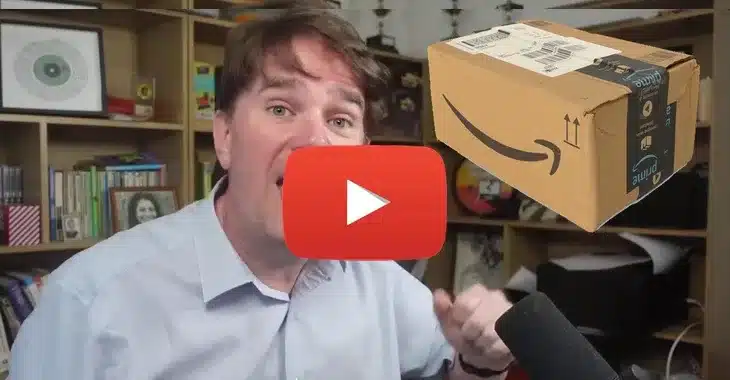 If I want to buy something on Amazon or eBay, I’m required to verify I am who I say I am. They’ll ask me for my username and password.
If I want to buy something on Amazon or eBay, I’m required to verify I am who I say I am. They’ll ask me for my username and password.
My password isn’t a matter of public knowledge, because I don’t want any of you to buy Michael Bublé CDs using my credit card.
If I want to post something on Twitter I will again have to jump through various hoops. It will ask me for a username a password, and then it will use Login Verifications to check that I am in physical possession of a phone that I have connected to my Twitter account.
That means if I am careless with my password, the chances of someone being able to hijack my Twitter account remain small. You won’t be able to tweet that I am a fan of Michael Bublé. Which wouldn’t be true.
However, if I want to vote in today’s UK election I don’t need a password. I don’t even need to show photo ID or dig out my passport.
All I have to do is show up to my local polling station, tell them my name and address (both easy to find out), and… well, that’s enough.
They’ll cross my name off their list and invite me to enter a little tent where I will put a cross next to the candidate of my least disliked party, and then potentially rue my decision for the next five years.
I’m not sure what happens if I turn up and they check their little list and say “Oh, we’ve already had a Graham Cluley from 23 Railway Cuttings, East Cheam in today. You must be an imposter.”
Do they try to work out who the fake Graham Cluley voted for? Do they give me two votes to make up for the bogus voter?
Wouldn’t it be better if there was at least some token effort made to verify people’s identity before they make a decision which could determine which party governs our country for the next five years?
An Electoral Commission report from 2014 appears to agree with me:
Finally, we should move to a system where voters are required to produce identification at polling stations. We gathered substantial evidence during our review that the lack of a requirement for ID is both an actual and a perceived weakness in the system. This move would introduce a new requirement for voters casting their ballot in a polling station, and we have considered carefully whether this will deter some voters from taking part. Our conclusion, again based on the evidence we gathered during the review, is that this risk can be managed and that it is therefore right to make this change, for the sake of the benefits it will bring in terms of improving the security of the system. A similar requirement already exists in Northern Ireland, where ID to vote has been required since 2002, as well as in many other countries.
I understand that people don’t want anyone to know who they have voted for, but an identity check at polling booths wouldn’t allow that.
I also understand that some people may want it to be private as to whether they voted or not (voting in the UK is not compulsory), but the current “little list” already makes a note of who has come in and who hasn’t, and doesn’t – of course – prevent anyone from spoiling their ballot paper if they wish.
I guess one concern is that in Britain we don’t have identity cards, and not everyone has a credit card, a driving license or a passport. As a minimum you would expect a polling station to require you to bring the little voting registration card that they send through the post – but they don’t even need you to bother with that.
There’s lots of talk about introducing e-voting in future, something I am sure many would have collywobbles over. But before we can even begin to consider taking that step, shouldn’t we introduce the most basic checks in polling booths that voters are who they say they are?
Leave a comment below with your thoughts. And don’t forget to vote. Or not. The choice is yours.
I just wish there was an anti-Michael Bublé party.



The question of what happens if someone "steals" your vote before you get to the polling station came up in conversation at home a few days ago and intrigued me enough to do some investigation.
Apparently, if you turn up at the poling station and your name has already been crossed off (which it could have been in error by the polling clerk), then you will be still be issued with a voting paper but it will be put in a different bag – not the ballot box.
There will then be "an investigation" and if it is proved that you were impersonated, the fraudulent vote will be discounted (every vote has a serial number recorded against the voters name so it can be identified in cases like this) and your vote, from the special bag, substituted.
What I couldn't find out is how the investigation is conducted and when. It is done by the police and can only assume it will not even be started before the count is complete so unless the count is close enough to be affected by the alleged fraud, the results will be announced without your vote.
I did have to piece together the above from a few sources – but the Electrol Commission was the main one.
In answer to your question about circumstances of investigation…
The corresponding number list is put into a sealed packet and "…the only occasion when the sealed packets can be opened is on the order of a judge as a result of an election petition out in furtherance of an investigation into an alleged election offence".
This system essentially dates back to the Ballot Act of 1872.
The same applies to tendered or ordinary ballot papers.
More info can be read in the FAQs #10 p.40 of the Electoral Commission Handbook for staff:
www.electoralcommission.org.uk/__data/assets/pdf_file/0005/164255/EPE-Polling-station-handbook.pdf
"every vote has a serial number recorded against the voters name"
Wait, really?
so it's not remotely anonymous.
I have always wondered why too Graham. As a British ID card early adopter I was more than miffed when Call Me Dave and his mates abolished them and refused to refund my £30. It was (and still is) very useful abroad where one has to prove one's identity often on a daily basis.
I agree with Paul's comments above. The ballot slips and counterfoils are prenumbered and there is a way to cross check and discover the fraudulent vote. I queried this with the Electoral Commission many years ago.
But this also allows the powers that be to see who you have voted for (if they wanted to) – so your vote is potentially not private anyway. If they switch to e-voting that information will be readliy obtainable.
I've never understood it either Graham – It's quite backward for a country as technologically advanced as the UK.
Sean Durrant
I suspect the lack of requirement to positively identify yourself is more to do with the lack of satisfactory options for what to do when someone cannot or will not identify themselves…refusing someone a vote is quite a serious matter (and inevitably would enforce certain socio-economic biases, just ask George Bush). There should be a simple and straightforward system that can be used, unfortunately history tells us that the government will be the one organisation guaranteed not to identify it!
With regard to the exclusion of the stolen ballot paper – having been to counts in the past, it is probably something that only happens if the result is close enough for the known number of dodgy ballots to make a difference – the serial number could be matched and removed during or prior to the recount. Thanks to our wonderful, equitable election system you only need to count the number of sacks for the leading candidate in the majority of constituencies.
Information Security, Political Commentary and Hancock's Half Hour references in the same site – surely an award winning blog.
The British voting system is traditionally built on trust, it is unique to us in that way due to the national character, but unfortunately with increasing immigration we are importing corrupt practices from other countries.
Regards the comment that "you only need to count the number of sacks for the leading candidate in the majority of constituencies", I have been to a count (I can't remember how I managed that now) and they counted all the ballots by hand, and they even collected the spoiled ballots together, and any messages written on the ballots were read out loud to everybody who was watching, which included some of the candidates, so it is worth writing a message if you want to spoil your ballot paper. That was a local election but I dare say it is the same for a national election.
Hi Graham,
I don't envy you,your choices today. But no picture id is a joke,even in the US. To go to the doctors,one needs a valid id,and even if expired you will be denied services. Try flying without propper id, or banking,or shopping as you mention. This notion of discrimination against those without id,is a liberal progressive one,and they encourage imigrants (illegal aliens here) to vote even though they are not eligible. Crazy right? But if you are for proper id,then you will be vilified by the leftist. There are too many ways for voter fraud to occur and some have been exposed in recent years,but,yet,still there is this irrational oposition to voter id.
Good luck to you and your fellow voters today, the rest of the world is watching and waiting.
In Northern Ireland, there used to be a practice called 'personation' by which the identities of recently deceased voters were used to increase the turnout. This practice gave rise to the saying "Vote early and vote often."
A number of sites appeared and then disappeared offering to buy postal votes or details from non-voters. Certainly helps to maximise your influence for a small fee, a lot of people are willing to sell their ballot which is a toss of the proverbial coin to them
Don't bash the Bublé – oh, ok, on seconds thoughts, carry on … and one from me too !!
i so agree with Techno, i live in tower hamlets and know what goes on 'here and there'…i cast my vote today and could have been the green headed 'person' from mars… or elsewhere for all anyone bothered to check..
I bet they'd change it pretty quickly if people started to cast the votes of candidates running.
I totally agree with you, i said to the wife "dont we need that paper thingy they sent us", "no" she said it's amazing. I had forgot you were not required to say or prove your identity. I also agree with bellwater and .techno.
I think Indiana and Arizona require proof of citizenship when registering to vote. What a novel idea! If you don't provide proof in Arizona, you can only vote in state elections, not Federal elections. (Or maybe it's the other way around, I can't remember.
Louisiana petitioned the Federal Election Commission to require proof of citizenship on Federal Registration forms, the only state which currently requires it.
Technically, you shouldn't need to show your identity. You should just need to show that
(1) You are eligible to vote (usually via the registration process)
(2) You have not already cast your vote
It should be possible to design a system where the voter never has to reveal their identity (name and address) at the polling station. This is left as an exercise for the reader.
It's a similar situation with buying alcohol. There's no need to disclose your name or even date of birth. You only need to prove that you're over [insert appropriate number for your country] years old.
Hi AY,
In the UK, there is already a system where the voter doesn't need to reveal their identity – they can be registered as an anonymous voter. In this situation, they *must* bring their poll card with them (other voters don't need to do this).
You can see more of how this works from a staff's perspective in Appendix 3, Page 26 of the Electoral Commission Handbook for staff:
www.electoralcommission.org.uk/__data/assets/pdf_file/0005/164255/EPE-Polling-station-handbook.pdf